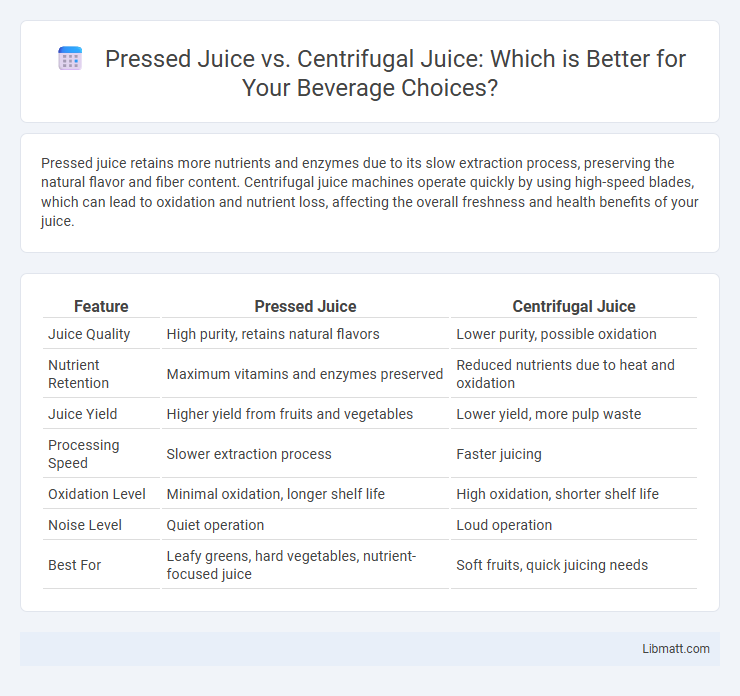Pressed juice retains more nutrients and enzymes due to its slow extraction process, preserving the natural flavor and fiber content. Centrifugal juice machines operate quickly by using high-speed blades, which can lead to oxidation and nutrient loss, affecting the overall freshness and health benefits of your juice.
Table of Comparison
| Feature | Pressed Juice | Centrifugal Juice |
|---|---|---|
| Juice Quality | High purity, retains natural flavors | Lower purity, possible oxidation |
| Nutrient Retention | Maximum vitamins and enzymes preserved | Reduced nutrients due to heat and oxidation |
| Juice Yield | Higher yield from fruits and vegetables | Lower yield, more pulp waste |
| Processing Speed | Slower extraction process | Faster juicing |
| Oxidation Level | Minimal oxidation, longer shelf life | High oxidation, shorter shelf life |
| Noise Level | Quiet operation | Loud operation |
| Best For | Leafy greens, hard vegetables, nutrient-focused juice | Soft fruits, quick juicing needs |
Introduction to Pressed Juice and Centrifugal Juice
Pressed juice is extracted using a hydraulic press that slowly crushes fruits and vegetables to preserve nutrients and retain a rich flavor profile. Centrifugal juice is made by rapidly spinning produce in a high-speed blender, which generates heat and introduces more oxygen, potentially reducing nutritional value. Your choice between pressed and centrifugal juice affects the freshness, nutrient content, and taste of the final beverage.
How Pressed Juicers Work
Pressed juicers operate by using hydraulic or cold-press technology to extract juice, maximizing nutrient retention by minimizing heat and oxidation. Unlike centrifugal juicers, which use fast-spinning blades to shred fruits and vegetables, pressed juicers slowly crush and press the produce, yielding higher juice quality with a richer flavor and more vitamins. Your juice from a pressed juicer typically contains less foam and pulp, preserving the natural enzymes and antioxidants that promote better health.
How Centrifugal Juicers Operate
Centrifugal juicers operate by rapidly spinning a metal blade against a filter basket, using centrifugal force to separate juice from pulp. The high-speed rotation extracts juice quickly but often introduces heat and oxygen, which can reduce nutrient retention and affect flavor. You can expect faster juicing with these machines, though they may produce juice with lower freshness compared to pressed juice methods.
Nutritional Differences Between Pressed and Centrifugal Juice
Pressed juice retains higher nutritional content due to its slow, cold-press extraction method, preserving enzymes, vitamins, and antioxidants that are often degraded by heat and oxidation. Centrifugal juicers use high-speed blades that generate heat and introduce more oxygen, leading to faster nutrient breakdown and lower vitamin C and enzyme levels. Studies indicate pressed juice contains significantly more bioavailable nutrients, making it a superior choice for maximizing health benefits.
Juice Yield Comparison: Pressed vs Centrifugal
Pressed juice typically yields a higher volume of liquid compared to centrifugal juice due to its slow, cold-press extraction method that maximizes juice retention from fruits and vegetables. Centrifugal juicers use fast-spinning blades to shred produce, often resulting in lower juice yield and more pulp waste. Studies show pressed juicers can produce up to 20-30% more juice, making them more efficient for extracting nutrient-rich liquids.
Taste and Texture: What to Expect
Pressed juice offers a richer, smoother texture with a naturally sweeter and more concentrated flavor, as it retains more nutrients and pulp from fruits and vegetables. Centrifugal juice tends to be lighter and less viscous, often containing more foam and a less intense taste due to the high-speed extraction method that exposes juice to air and heat. Your choice between these juicing methods will affect the freshness and mouthfeel of your drink, with pressed juice providing a fuller sensory experience.
Oxidation and Shelf Life
Pressed juice retains more nutrients and experiences less oxidation than centrifugal juice due to its slower extraction process, which minimizes air exposure. Centrifugal juice undergoes rapid oxidation as high-speed blades introduce more oxygen, leading to faster nutrient degradation and a shorter shelf life. Consequently, pressed juice generally offers a fresher taste and longer preservation time compared to centrifugal juice.
Cleaning and Maintenance: Which Is Easier?
Pressed juicers generally require more thorough cleaning due to their multiple components, including the pressing chamber and strainer, while centrifugal juicers feature fewer detachable parts, making them quicker to rinse and assemble. The cold-press mechanism in pressed juicers often traps pulp more tightly, necessitating extra scrubbing, whereas centrifugal juicers use spinning blades that produce more pulp but are easier to dislodge during cleaning. Users prioritizing convenience and minimal maintenance typically prefer centrifugal juicers for their simplicity, despite the potential nutritional benefits of pressed juice.
Cost Analysis: Price and Value
Pressed juice machines generally have a higher upfront cost compared to centrifugal juicers, but they offer greater juice yield and nutrient retention, enhancing long-term value. Centrifugal juicers are more affordable initially and faster in processing, yet they often produce juice with lower quality and shorter shelf life, potentially increasing overall consumption costs. Investing in a cold-pressed juicer may result in better health benefits and cost efficiency over time despite the steeper price tag.
Which Juicer Is Best for Your Lifestyle?
Pressed juice retains more nutrients and enzymes due to its slow extraction process, making it ideal for health enthusiasts seeking maximum nutritional benefits. Centrifugal juicers operate faster and are typically more affordable, suited for those with busy lifestyles needing quick juice preparation. Choose a pressed juicer if your priority is nutrient density and freshness, or a centrifugal juicer if convenience and speed fit your daily routine better.
Pressed juice vs centrifugal juice Infographic

 libmatt.com
libmatt.com